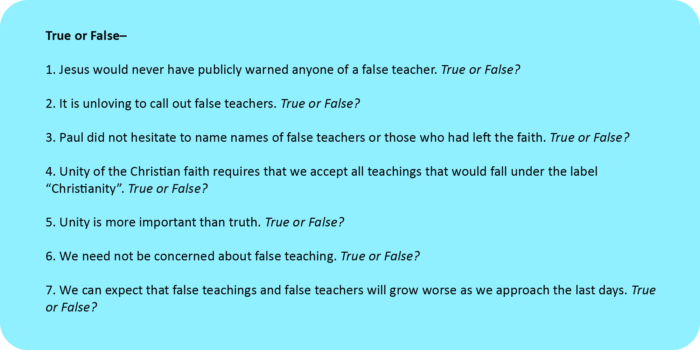The Perfect Climate
It’s been an interesting last ten or twenty years. To say the least. I have watched as false teachers have deceived thousands of people claiming to be Christians–maybe even millions–with hardly even a word from the true church. As more and more leaders, authors, and pastors compromise, they draw more and more away from biblical Christianity.
Just as mold grows in the perfect climate of damp darkness, so, too, does apostate religion. Why are so many Christians deceived? Why are so many who claim Christ falling away into a self-centered religion that is nothing like what Christ taught? Why are they not holding to God’s Word?
We true believers stand by shaking our heads in bewilderment but if we stop and think for just a moment, it makes so much sense. There are six things that have slowly evolved over time that have made every man, woman, and child who would claim to be a Christian susceptible to false religion. These things have changed so slowly that we may not even have thought about them. The changes have been taking place for 100 years or more but took on warp speed in certain decades. Like this one.
These six things create the perfect climate for false religion to grow. They pose as grave dangers not only for the church at large but for each and every one of us. While there is not a whole lot we can do to change the situation as a whole, we can work to eliminate these things from our own lives and from the lives of our children. We can also be used by God to make other Christians aware of these dangers so that they aren’t deceived.
1. Biblical Illiteracy This is the first one in both order and importance. Even those who would consider themselves “good” Christians rarely open their Bibles. Many–probably most–who call themselves a Christian are satisfied by a devotional that barely contains the Word of God or they neglect time in the Word completely. Even many preachers have left the solid expositing of the Word in favor of entertaining stories. We have become so ill-equipped. How can we see if we aren’t using our lamp? (Psalm 119:105) How can we fight if we aren’t using our sword? (Ephesians 6:17) How can we examine if something is true or false, if we do not know what is true? (Acts 17:11)
How important it is that we are not among these neglectful and powerless Christians. As you may already know, my main goal here at Growing4Life is to get you in the Word, comparing every single thing by the Word. It is literally our only anchor. If you aren’t in the Word on a regular basis you will be deceived and tossed about.
2. Self-Idolatry Not far behind biblical illiteracy in importance is self-idolatry. Now before you skim over this part thinking it hasn’t affected you, may I challenge you for a moment? God has been opening my eyes to show me that even we believers who really desire to please Him have fallen for this one. At least I have. In many ways, without even realizing it, we have become obsessed with ourselves. We are driven and motivated by our selfish desires and this shows up in a myriad of ways: We read the scriptures looking for personal application and if it’s not there, we quickly grow bored. We love to be comfortable and we hate–and even refuse–to step outside our “comfort zones”. We grow discouraged if we don’t receive praise and gratitude for a job well done or if someone else receives the credit for something we did. We are focused on fulfilling our dreams and finding our purposes. We are preoccupied with how we look, how much money we can make, who likes us, and what people think of us. In fact, it is our love for self that often keeps us from speaking the truth in the midst of all this false religion. We try to avoid pain at all costs. We try to avoid persecution at all costs. And then we call ourselves holy for staying silent. It is so mixed up.
The thing is this: Love of self is the complete opposite of the way of the cross. There is no amalgamation between the two. There are only two religions and they are polar opposites.
One is centered on self: What I can do to earn eternal life or to be close to God; God will help me fulfill my dreams; My feelings and experiences are the determiners of truth; The popularity and praise of people determines the validity of my ministry.
And the other one is centered on God: I recognize that I can do nothing to earn eternal life and rely wholly on God’s grace; I replace my purpose and dreams for God’s plans and purposes; I look to God’s Word for objective truth instead of relying on subjective feelings and experiences; And I am more concerned with God’s glory than with mine.
In fact, true religion is a lifetime of learning to crucify self so that Jesus Christ may be glorified. We, in essence, give up our lives for Christ. Paul puts it like this in Galatians 2:20–
I have been crucified with Christ; it is no longer I who live, but Christ lives in me; and the life which I now live in the flesh I live by faith in the Son of God, who loved me and gave Himself for me.
3. Celebrity Infatuations We have become greatly enamored with men and women. If we aren’t careful, we start equating them with God and His Word. While I would never judge motives or the heart of any teacher, I am amazed at how many over the past ten years or so have left biblical truth and waded into compromise without nary a word from the Christian community. I have been greatly disheartened to watch their followers follow them right off the proverbial cliff. This is only possible because people have chosen to follow man instead of God. We must be sure that our final word is God’s Word and not man’s (or woman’s).
We are all susceptible to this. It is painful to realize that the person who helped you grow or was a tremendous support to you during a difficult time of spiritual growth can no longer be trusted. I get it. I’ve been there. The easiest thing to do is to close your eyes and forge ahead. But if we are to stay on the straight and narrow we must be Bereans and compare all things said and done–even the things by the teachers and authors we dearly love and are quite attached to–to scripture.
4. Bullying I find it rather ironic, that in an age that is so conscious of bullying, it is going on at a record rate towards anyone who would stand for biblical truth. Both outside the church and within its doors, anyone who would speak the truth in love about these matters of false religion and false teachers is called names, scorned, and mocked. They are marginalized and they are persecuted. It is a very interesting and extremely effective way for false religion to grow. Mock and scorn anyone who dissents. Don’t allow for any differing opinions–even if they are solidly based on the Word of God.
5. Speak Only the Positive Even many well-meaning Christians have fallen prey to this thinking that we can only speak positive words. But, of course, any study of scripture will soon reveal that sometimes we must speak the negative. Jesus, Paul, Peter, John, James, and Jude, and countless others in scripture, spoke both positive encouraging words as well as negative, rebuking words. As believers, we must be carefully balanced. Many times, Philippians 4:8 is used as the defense for speaking only the good–
Finally, brethren, whatever things are true, whatever things are noble, whatever things are just, whatever things are pure, whatever things are lovely, whatever things are of good report, if there is any virtue and if there is anything praiseworthy—meditate on these things.
But we must take note that what is true and what is just are not always positive. Sometimes we must think on the negative. Sometimes we must speak the negative. And we are not sinning by doing so.
I could go into the history of positive thinking if I had time today, but, suffice it to say, it is a doctrine of man and not of God. How duped we are if we believe that to speak negative words is sinful. Nothing could be further from the truth.
6. We Compare Ourselves to Ourselves Because things are so messed up, we end up looking pretty good even if we are living a nominal Christian life. We take a look around at the world and even at the church and we can be tempted to think that we do not look so bad. We become complacent and maybe even a bit proud in our faith. This kind of attitude is a bane to our spiritual health. Thinking we stand, we set ourselves up to fall (I Corinthians 10:12). We must compare ourselves to God’s Word. Only there will we see the truth. We have to stop looking around at others and thinking we are pretty good, lest we be deceived.
I have no delusions that this post will make even a dent in what’s going on in religion today. It is way too far gone. My only hope is that it will draw the attention of even a few believers so that we can protect ourselves and make sure they aren’t happening to us personally. I also hope that it will give you, my readers, the big picture and help you understand why false religion is flourishing today in a way it never has before.
God bless you as you seek to live for Christ in this confusing time. He will protect and keep us. The remnant of true believers will continue their march to victory! Of that we can be sure!











